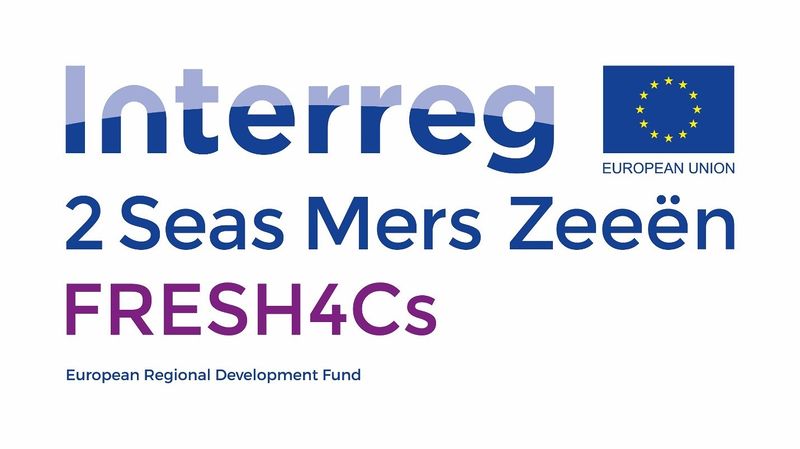PR 00309: verschil tussen versies
(Kleine aanpassingen.) |
Geen bewerkingssamenvatting |
||
| Regel 9: | Regel 9: | ||
''Project ‘FRESH4Cs’ is financed by the Interreg 2 Seas, a transborder collaborative programme which receives financial aid from the European Regional Development Fund. For more information, please visit:'' {{Cite|resource=Resource Hyperlink 00737|name=www.fresh4cs.eu|dialog=process-linkwebsite-dialog}} | ''Project ‘FRESH4Cs’ is financed by the Interreg 2 Seas, a transborder collaborative programme which receives financial aid from the European Regional Development Fund. For more information, please visit:'' {{Cite|resource=Resource Hyperlink 00737|name=www.fresh4cs.eu|dialog=process-linkwebsite-dialog}} | ||
{{Project config}} | {{Project config}} | ||
{{Project | {{Project | ||
| Regel 16: | Regel 15: | ||
|Start date=2019/02/15 | |Start date=2019/02/15 | ||
|End date=2022/09/30 | |End date=2022/09/30 | ||
|Summary= | |Summary=Het FRESH4Cs project richt zich op de voorziening van alternatieve en duurzame zoetwaterbronnen voor laaggelegen kustgebieden. Door de schaarste van zoetwaterbronnen, verzilting van nabijgelegen oppervlaktewateren en het verlies van zoet water dat naar zee wordt afgevoerd, staan met name laaggelegen kustgebieden onder druk. Dit project richt zich op het vinden of creëren en opslaan van alternatieve zoetwatervoorraden en de technologische, sociale en economische uitdagingen die dit proces met zich meebrengt. | ||
|Show summary=Nee | |Show summary=Nee | ||
|SummaryEn=The FRESH4Cs project focuses on the provision of alternative and sustainable fresh water resources for lowland coastal regions. Due to scarcity of fresh water resources, salinization of nearby surface waters and the loss of fresh water drained to the sea, coastal lowlands are particularly under pressure. This project focuses on finding or creating and storing alternative fresh water supplies and the technological, social and economic challenges associated with this process. | |||
|Contact person=Gebruiker:Emma McAteer | |Contact person=Gebruiker:Emma McAteer | ||
|Stakeholder=STKH 00054,STKH 00050,STKH 00079,STKH 00121,STKH 00122,STKH 00125,STKH 00130,STKH 00131,STKH 00123 | |Stakeholder=STKH 00054,STKH 00050,STKH 00079,STKH 00121,STKH 00122,STKH 00125,STKH 00130,STKH 00131,STKH 00123 | ||
Huidige versie van 20 feb 2024 om 12:57
The Water Technology Research Group is working on an Interreg 2 Seas Project called FRESH4Cs; an acronym for alternative fresh water resources for saline coastal areas. This project started in February 2019 and will run for four years until September 2022. The project was granted funding by the Interreg 2 Seas Programme, the aim of which is to support and develop a 2 Seas area where the natural resources are protected; the FRESH4Cs project in this case focuses on the resource of fresh water.
Traditional water resources are under pressure in the 2 Seas area, with this problem being even more prominent in lowland coastal areas due to salinization of surface waters. These same coastal areas drain vast amounts of water towards the sea at moments of water surplus, for example in the winter but can also experience a shortage in fresh water supply or drought in summer. Also the effluent from a local wastewater treatment plant with the potential of being used in agriculture, both communal and private, is being transported to the sea. Fresh water supply in these areas can be viewed as a seasonal issue, therefore, the main objective of the FRESH4Cs project is to provide year-long sustainable fresh water supply for the different water users in coastal lowlands, as an alternative to using overexploited deeper aquifers or long distance water supply through pipelines.
Five pilot locations will be set up in the project in the Netherlands, Belgium and the United Kingdom in order to install and test alternative methods of fresh water supply. The different methods include, managed aquifer recharge, storage and redistribution. Also the possibilities of using effluent from a wastewater treatment plant for managed aquifer recharge and storage in open water bodies is being investigated. Part of the research is a compliance check against law and regulations and possibilities for improvement of the effluent quality. These pilot locations will benefit local actors in the water field: water managers (governmental or private), water utilities and water users such as farmers, tourism and drinking water production. The partners working together on this project include; VITO, Vlakwa, IWVA and VLM from Belgium, Suffolk County Council, Felixstowe HydroCycle Ltd and University of East Anglia in the UK and Dow Benelux B.V., Lamb Weston Meijer and HZ University of Applied Sciences in the Netherlands.
The Water Technology Research Group will be responsible for a technology assessment as well as the setting up of a monitoring plan for each pilot location; this will be performed by Hans Cappon, Emma McAteer and Bart Letterie. The information gathered during the testing and monitoring phase will be analysed and compared for best practice conclusions, the best practices will be used to feed into the development of a roadmap for widespread implementation which will be executed by Ageeth van Maldegem and Stef Bleyenberg.
Project ‘FRESH4Cs’ is financed by the Interreg 2 Seas, a transborder collaborative programme which receives financial aid from the European Regional Development Fund. For more information, please visit: www.fresh4cs.eu

